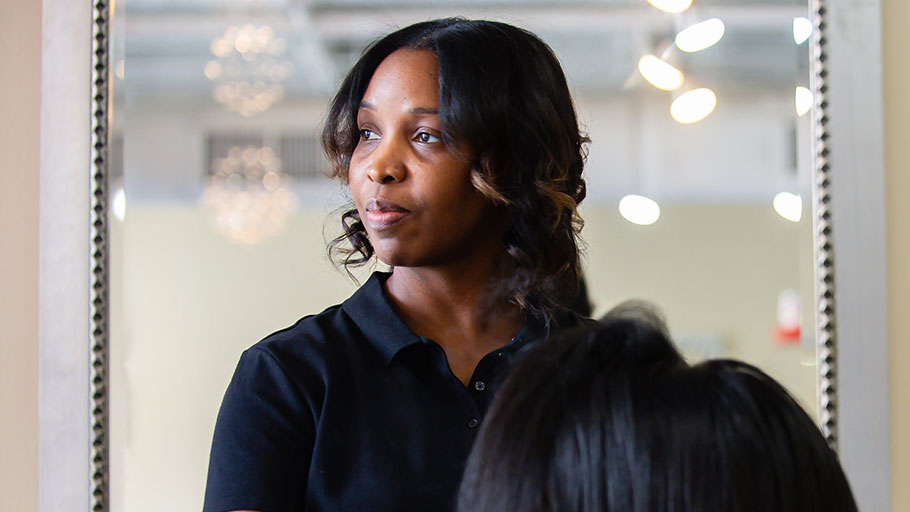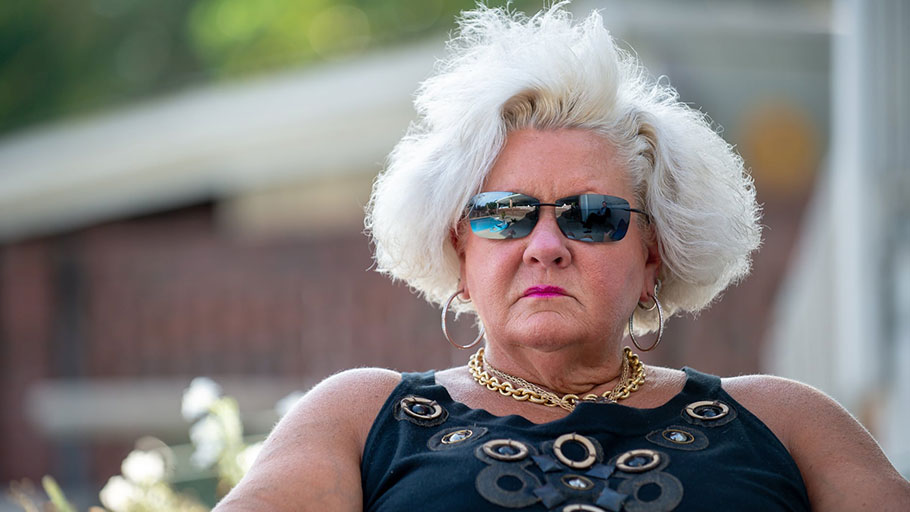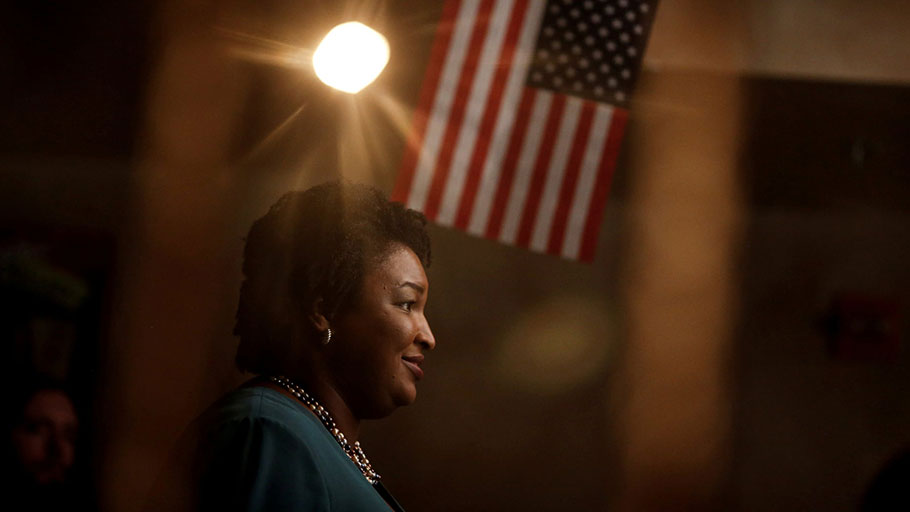Stacey Abrams is running in Georgia to become America’s first black female governor. Photograph: Christopher Aluka Berry/Reuters
Progressive Democrat Stacey Abrams is taking on Trump-style Republican Brian Kemp in a state where all 82 of its governors have been white men.
By David Smith, The Guardian —
In “Sweet Auburn”, a short walk from the birthplace and stone tomb of Martin Luther King Jr, salon owner Terrica Jones is silking hair with a ceramic iron and contemplating an opportunity that once seemed unthinkable: to vote for a black woman to lead Georgia, a deep south state haunted by slavery and segregation.
“When I was growing up, it would have been a dream,” says Jones, 41, an African American in Atlanta. “Today I think anybody can be governor. The important thing is you have to have the heart to do it.”
A decade after Barack Obama became America’s first black president, Stacey Abrams is bidding to become its first black female governor. But standing in the Democrat’s way in Georgia, where all 82 governors have been white men, is Brian Kemp, a Republican unapologetically borrowing from Donald Trump’s populist playbook. Kemp has described the November election as a battle for “literally the soul of our state” – he might have added that it is a battle for the soul of the nation.
As Obama and Trump hit the campaign trail for the midterm elections, in what is likely to be cast as an existential struggle between hope and fear, Abrams and Kemp are perhaps their most vivid avatars. With tensions around gender and race, allegations of voter suppression and radically different policies on education, healthcare, immigration, gun rights and worker protections, the result will reverberate across the country and could help define the contours of the 2020 presidential election.

Terrica Jones: ‘Today I think anybody can be governor. The important thing is you have to have the heart to do it.’ Photograph: Bita Honarvar for the Guardian
Abrams, 44, is hoping to ride a widely predicted “blue wave” in this year’s midterms. Some Democrats are women, some are people of colour, some belong to a younger generation and some embrace progressive policies. Abrams is all four. She is also one of six siblings who grew up in Gulfport, Mississippi, a Yale law graduate, a former state legislative leader and the award-winning author of eight romantic suspense novels under the pen name Selena Montgomery.
She is counting on support in Atlanta, the thriving state capital where skyscrapers include the headquarters of CNN and Coca-Cola. For Jones, who runs the Formulas Hair and Beauty Bar on Auburn Avenue, a historic main street of black businesses and homes (described in 1956 by Fortune magazine as “the richest street in the world for Negroes”), the symbolism of Abrams’ candidacy is less important than bread-and-butter concerns such as healthcare. She is currently unable to afford a monthly premium of $368. “Luckily, I’m healthy,” she said. Like many progressive Democrats, Abrams has promised an ambitious healthcare expansion.
“As a black woman, it’s my duty to vote for her” — Vony Tza.
Past a mural of the local congressman and civil rights hero John Lewis is the church where King preached, then his final resting place sitting atop a blue reflection pool near an eternal flame and gift shop. Vony Tza, a 33-year-old business owner visiting the site last Wednesday, is another Abrams supporter.
“As a black woman, it’s my duty to vote for her,” she explained. “It’s a way to move forward and, even if she wasn’t running, I would be voting against her opponent.”
Nearby is the Victorian house where King was born and lived until he was 12. Whitney Miller, 30, a soldier, who brought her 10-year-old son, Elijah, on a guided tour, said she intends to vote for Abrams.
“I like the things she values and, to be honest, I would like to see an African American woman in that position. After all our plight in life and politics, it would a great image for African Americans to see. We have a limitless future.”
But Abrams is the underdog in a state where no Democrat has won a gubernatorial or Senate election in the 21st century, and where four years ago Republicans took the governor’s mansion by more than 200,000 votes.
‘That old south mentality’
Kemp, 54, a two-term secretary of state, appears to have embraced Trump in style and substance. During the Republican primary, he branded himself a “politically incorrect conservative”. In one TV ad, he pointed a shotgun at a young man and said: “I’m Brian Kemp, this is Jake, a young man interested in one of my daughters.” (Abrams supports an assault rifle ban.) In another, Kemp boasted: “I’ve got a big truck, just in case I need to round up criminal illegals and take ’em home myself.” (Abrams has condemned Trump’s immigration policies as “cruel and inhumane”.)
At Manuel’s Tavern, a local institution, Darryl Lyons, 53, a manager and sports coach in higher education, said: “I feel so many people in Georgia are going to connect with Kemp. He’s pushing that old south mentality. Abrams is progressive and the rest of the state isn’t, unfortunately. I can see it not happening for her because so many people want to keep us back.”
Awaiting dinner at a nearby table, Brooks Jenkins, 35, a sales manager, remained hopeful of a surprise win: “It would be shocking and phenomenal and a wonderful, wonderful sign that we are looking at the content of character, not the colour of people’s skin.”
Victory for Abrams would indeed be a defining moment in the history of Georgia, a key part of the Confederacy during the civil war, in which the burning of Atlanta dealt a critical blow to the south. The end of slavery was succeeded by Jim Crow laws, exploitation and terror. Georgia witnessed 589 lynchings of African Americans between 1877 and 1950, according to the Equal Justice Initiative, a total surpassed only by Mississippi. Photos from the early 20th century show the state capitol dome in Atlanta soaring over black people living in shacks.
“Absent of voter suppression, Abrams wins” — Cliff Albright, Black Votes Matter Fund
But popular culture offers one clue to the state’s transformation. Author Margaret Mitchell lived in Atlanta and situated her protagonist Scarlett O’Hara there in the civil war-era novel Gone with the Wind. A more recent export is Black Panther, a blockbuster set in a hi-tech African kingdom which proved a huge hit with black cinemagoers in America and beyond. In 2016, with the help of tax incentives, more big feature films were made in Georgia than California, earning it the soubriquet the “Hollywood of the south”.
While Atlanta is already a liberal stronghold, Democrats believe statewide demographics are moving in their direction. Georgia’s population has soared nearly 30% to 10.4 million over two decades, the proportion of registered voters who are not white rising from 27% to 46%. In Abrams’ campaign headquarters, pins are stuck in a state map under a sign that insists: “Stacey Abrams has supporters in all 159 Georgia counties.”

Cliff Albright: ‘You’ve got to run a statewide campaign. There’s no map to flipping Georgia that just runs through Metro Atlanta.’ Photograph: Bita Honarvar for the Guardian
Cliff Albright, co-founder and executive director of the Black Voters Matter Fund, said: “There has been a narrative since 2016 that the Democrats ignored white rural America, but most of black America in the south is rural. You’ve got to run a statewide campaign. There’s no map to flipping Georgia that just runs through metro Atlanta. Period. It takes support from outside.”
The point was illustrated last December when Roy Moore, a scandal-plagued Trump-backed Republican, suffered a shock defeat in neighbouring Alabama, not only because of high turnout in Democratic bastions such as Birmingham but also because of an energised African American vote in rural parts of the state.
Republicans in Georgia stand accused of trying to shut down multiple polling places in majority black counties. Kemp’s office cancelled the registration of more than half a million voters last year, ostensibly in an effort to clean up the voting rolls. Albright said he has taken calls from voters who received letters warning that they could be purged over spurious technicalities.
“It’s clear what the intentions are,” he continued. “Absent of voter suppression, Abrams wins. My biggest concern is the stuff we don’t have control of: the suppression, the tampering with machines. We don’t have a paper trail in Georgia. When you have a secretary of state who refuses to step down while he is running for governor, it opens the way for all sorts of irregularities.”
But if such hurdles can be overcome, Albright is in no doubt of the magnitude of the prize. “The symbolism of it is to have a black woman running one of the lead states of the Confederacy. It’s a new south where black people, and in particular black women, are playing a central role in leadership.
“In some ways, it’s bigger than Obama in 2008. Seeing the nation elect a black president is one thing. But you tell a 70-year-old in Hancock county, Terrell county, Baker county or Sumter county that a black woman with natural hair is going to be governor and that’s a different level of emotion.”
Albright also noted the contest in Florida where the Democrat Andrew Gillum, the state’s first black major party nominee for governor, is taking on Ron DeSantis, a Trump-backed white man who has used racially inflammatory rhetoric.
“Georgia and Florida are both microcosms of the national battle,” he said. “Progressives who happen to be black running against conservatives who represent the same level of white supremacy that’s coming out of the White House. The battle lines are clear.”
The Georgia election will be studied closely as a battle of the bases, Trump diehards against ardent progressives. An Abrams win is likely to strengthen the hand of those who argue in favour of pushing left and courting people of colour and white progressives rather than bending towards the centre.
Albright said: “Wins for the Democrats in Georgia and Florida will really send a message. It will be impossible for that to happen and folks not to have a clear blueprint for what to do in 2020.”
‘Socialists are the most racist people on the planet’
A barometer of Georgia’s changing face is the city of Gainesville, dubbed the “poultry capital of the world” because of its chicken processing plants, which draw large numbers of Latino workers. Many shop signs are written in Spanish. Kemp is predicted to perform strongly here, especially among white voters who backed Trump in 2016.
“I am sick and tired of American terrorists… all the radicalism going on on campuses, all the threats to the president” — Dale Faunce
Dale Faunce, 68, marketing director for a poultry-producing company, said: “I’m straight Republican. I am sick and tired of American terrorists – all the radicalism going on on campuses, all the threats to the president, all the threats that people wearing the wrong clothing get. It’s time to be civil and get rid of all the insult hurling and everything that came up over the last eight years.”
He added, without evidence: “The racists in this country are really pushing the black female. Socialists are the most racist people on the planet.”
At the Wild Wings Cafe, Brendan and Kim Courtney also swore allegiance to Kemp and denied that he is a mere mini-Trump. Brendan, 59, who works in human resources, said: “He has his own unique style. His initial ads were meant to grab your attention. Now they are more mellow.”
Kim, a 53-year-old retired pastry chef, added that it “doesn’t matter” to her that all Georgia’s previous governors have been white men.
“We go by the policies and how they affect us personally,” she said. “I wouldn’t vote for Stacey Abrams because she’s a woman. You vote for what’s best for yourself and for your family. You have to be a bit selfish.”

Ann Jones: ‘Racism is only a problem for the people that continue to stir the pot.’ Photograph: Bita Honarvar for the Guardian
In the nearby town of Flowery Branch, Ann Jones, who gave her age as somewhere in her 50s, and her husband Ike Swofford, 67, run a 60-acre farm with horses and cattle. Both voted for Trump and believe he is doing “an excellent job”. Jones has known Kemp since the late 1980s.
“He’s genuine, he’s intelligent, he’s successful, he’s articulate,” she said. “He surrounds himself with the best and the brightest.”
Jones was unmoved by Abrams’ effort to smash a double-glazed glass ceiling. “I don’t care for her policies,” she said. “She’s well-spoken and I believe she’s intelligent but her policies are tax and spend. It matters not to me if she’s black: breaking a record for the sake of breaking a record is never a good thing.
“Racism is only a problem for the people that continue to stir the pot. Anyone willing to stand up and do their part, regardless of creed or colour, will be treated fairly. Something happens and they say: ‘Oh, it was racially motivated.’ No, it wasn’t.”
Kemp is, like many Republican candidates, a white man. Abrams typifies a diverse Democratic field. Some say it is a clash of the past and the future. Not Jones.
“There are folks who would like to see Georgia turn purple and roll over to blue,” she mused, relaxing beside a swimming pool in view of the stables. “I don’t have a crystal ball. But I can’t see it in my lifetime.”















